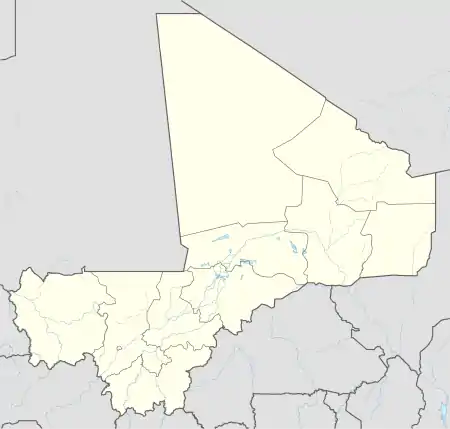Doumanaba
Doumanaba is a small town and rural commune in the Cercle of Sikasso in the Sikasso Region of southern Mali. The commune covers an area of 288 square kilometers and includes the town and seven villages.[3] In the 2009 census it had a population of 15,105.[2] The town of Doumanaba, the chef-lieu of the commune, is 49 km northwest of Sikasso.
Doumanaba | |
|---|---|
Commune and town | |
 Doumanaba Location in Mali | |
| Coordinates: 11°40′9″N 5°55′50″W | |
| Country | |
| Region | Sikasso Region |
| Cercle | Sikasso Cercle |
| Area | |
| • Total | 288 km2 (111 sq mi) |
| Population (2009 census)[2] | |
| • Total | 15,105 |
| • Density | 52/km2 (140/sq mi) |
| Time zone | UTC+0 (GMT) |
The French explorer René Caillié stopped at Doumanaba in February 1828 on his journey to Timbuktu. He was travelling with a caravan transporting kola nuts to Djenné. In his book Travels through Central Africa to Timbuctoo published in 1830, he refers to what was then a village as Toumané.[4] Caillié was impressed with the range of goods on sale in the market and wrote:
I went to see the market, which I found better than those of the villages through which I had previously passed. It was held under a sort of penthouse, which kept off the rain in bad weather. It was very well supplied with all the productions of the country. I even saw butcher's meant and European commodities, such as cloth, muskets, powder and glass trinkets.[5]
References
- Common and Fundamental Operational Datasets Registry: Mali, United Nations Office for the Coordination of Humanitarian Affairs, archived from the original on 2012-01-06. commune_mali.zip (Originally from the Direction Nationale des Collectivités Territoriales, République du Mali)
- Resultats Provisoires RGPH 2009 (Région de Sikasso) (PDF) (in French), République de Mali: Institut National de la Statistique, archived from the original (PDF) on 2012-07-27.
- Communes de la Région de Sikasso (PDF) (in French), Ministère de l’administration territoriale et des collectivités locales, République du Mali, archived from the original (PDF) on 2013-12-03.
- Viguier 2008, p. 48.
- Caillié 1830, p. 410.
Sources
- Caillié, René (1830). Travels through Central Africa to Timbuctoo; and across the Great Desert, to Morocco, performed in the years 1824-1828 (Volume 1). London: Colburn & Bentley.
- Viguier, Pierre (2008). Sur les Traces de René Caillié: Le Mali de 1828 Revisité. Versailles, France: Quae. ISBN 978-2-7592-0271-3..
External links
- Plan de Sécurité Alimentaire Commune Rurale de Doumanaba 2006-2010 (PDF) (in French), Commissariat à la Sécurité Alimentaire, République du Mali, USAID-Mali, 2006, archived from the original (PDF) on 2012-09-11, retrieved 2012-09-08.
